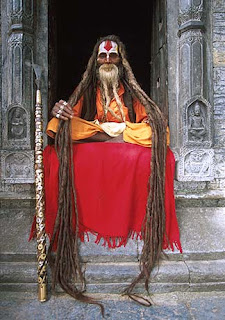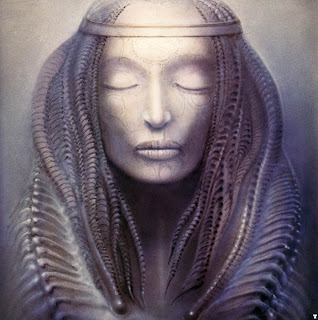




Here I stand Flesh, Bone, and Dreadlocks. I had to include another shot of my dreads...along with some other dope ones out there. The HR Giger one is wicked. I'm on my second set of dreads right now. The first ones were back in highschool and they didn't come out so well. But I missed them so much after I cut them off that I wanted them until I started my second set, which was 5 years later. Now I've had this current set for 5 years.
This town has a growing popularity for the hairstyle, so I get a lot of attention and love about them. The only problem that comes along with them is the stigma that I'm a hippie stoner. Well I am a stoner...so what? I'm here to change the impressions of dreads. They ain't just for the dirty.
Dreadlocks are the natural state of hair.
The first known examples of dreadlocks date back to ancient dynastic Egypt. Examples of Egyptians wearing locked hairstyles and wigs have appeared on bas-reliefs, statuary and other artifacts. Mummified remains of ancient Egyptians with locks, as well as locked wigs, also have been recovered from archaeological sites.
The Hindu deity Shiva and his followers were described in the scriptures as wearing "jaTaa", meaning "twisted locks of hair", probably derived from the Dravidian word "caTai", which means to twist or to wrap. The Greeks, the Pacific Ocean peoples, the Naga people and several ascetic groups within various major religions have at times worn their hair in locks, including the monks of the Ethiopian Coptic Church, the Nazirites of Judaism, the Sadhus of Hinduism, and the Dervishes of Islam among others. The very earliest Christians also may have worn this hairstyle. Particularly noteworthy are descriptions of James the Just, first Bishop of Jerusalem, who wore them to his ankles.
Locks may have also been part of Mesoamerican culture before the 16th century Spanish conquest.
In Senegal, the Baye Fall, followers of the Mouride movement, a sect of Islam indigenous to the country which was founded in 1887 by Shaykh Aamadu Bàmba Mbàkke, are famous for growing locks and wearing multi-colored gowns. Cheikh Ibra Fall, founder of the Baye Fall school of the Mouride Brotherhood, claims that he was "the first dread in West Africa".
The Hindu deity Shiva and his followers were described in the scriptures as wearing "jaTaa", meaning "twisted locks of hair", probably derived from the Dravidian word "caTai", which means to twist or to wrap. The Greeks, the Pacific Ocean peoples, the Naga people and several ascetic groups within various major religions have at times worn their hair in locks, including the monks of the Ethiopian Coptic Church, the Nazirites of Judaism, the Sadhus of Hinduism, and the Dervishes of Islam among others. The very earliest Christians also may have worn this hairstyle. Particularly noteworthy are descriptions of James the Just, first Bishop of Jerusalem, who wore them to his ankles.
Locks may have also been part of Mesoamerican culture before the 16th century Spanish conquest.
In Senegal, the Baye Fall, followers of the Mouride movement, a sect of Islam indigenous to the country which was founded in 1887 by Shaykh Aamadu Bàmba Mbàkke, are famous for growing locks and wearing multi-colored gowns. Cheikh Ibra Fall, founder of the Baye Fall school of the Mouride Brotherhood, claims that he was "the first dread in West Africa".
In Jamaica the term dreadlocks was first recorded in the 1950s as a term for the "Young Black Faith", an early sect of the Rastafari which began among the marginalized poor of Jamaica in the 1930s, when they ceased to copy the particular hair style of Haile Selassie I of Ethiopia and began to wear dreadlocks instead. It was said that the wearer lived a "dread" life or a life in which he feared God, which gave birth to the modern name 'dreadlocks' for this ancient style.
Most Rastafari still attribute their dreadlocks to Selassie as well as the three Nazarite vows, in the Book of Numbers, the fourth of the books of the Pentateuch[citation needed].
All the days of the vow of his separation there shall no razor come upon his head: until the days be fulfilled, in the which he separateth himself unto the LORD, he shall be holy, and shall let the locks of the hair of his head grow. (Numbers 6:5, KJV)
Nazarites for life who wore locks and were mentioned in the Bible include the Nazarites Samuel, John the Baptist, and probably the most famous biblical figure with locked hair, Samson, who, according to scripture, had seven locks and lost his great strength when they were cut
Most Rastafari still attribute their dreadlocks to Selassie as well as the three Nazarite vows, in the Book of Numbers, the fourth of the books of the Pentateuch[citation needed].
All the days of the vow of his separation there shall no razor come upon his head: until the days be fulfilled, in the which he separateth himself unto the LORD, he shall be holy, and shall let the locks of the hair of his head grow. (Numbers 6:5, KJV)
Nazarites for life who wore locks and were mentioned in the Bible include the Nazarites Samuel, John the Baptist, and probably the most famous biblical figure with locked hair, Samson, who, according to scripture, had seven locks and lost his great strength when they were cut
Dread
1.
to fear greatly; be in extreme apprehension of: to dread death.
2.
to be reluctant to do, meet, or experience: I dread going to big parties.
3.
Archaic. to hold in respectful awe.–verb (used without object)
4.
to be in great fear.–noun
5.
terror or apprehension as to something in the future; great fear.
6.
a person or thing dreaded.
7.
dreads, Informal. dreadlocks.
8.
Informal. a person who wears dreadlocks.
9.
Archaic. deep awe or reverence.–adjective
10.
greatly feared; frightful; terrible.
11.
held in awe or reverential fear.
1.
to fear greatly; be in extreme apprehension of: to dread death.
2.
to be reluctant to do, meet, or experience: I dread going to big parties.
3.
Archaic. to hold in respectful awe.–verb (used without object)
4.
to be in great fear.–noun
5.
terror or apprehension as to something in the future; great fear.
6.
a person or thing dreaded.
7.
dreads, Informal. dreadlocks.
8.
Informal. a person who wears dreadlocks.
9.
Archaic. deep awe or reverence.–adjective
10.
greatly feared; frightful; terrible.
11.
held in awe or reverential fear.
Lock
1.
a device for securing a door, gate, lid, drawer, or the like in position when closed, consisting of a bolt or system of bolts propelled and withdrawn by a mechanism operated by a key, dial, etc.
2.
a contrivance for fastening or securing something.
3.
(in a firearm)
a.
the mechanism that explodes the charge; gunlock.
b.
safety (def. 4).
4.
any device or part for stopping temporarily the motion of a mechanism.
5.
an enclosed chamber in a canal, dam, etc., with gates at each end, for raising or lowering vessels from one level to another by admitting or releasing water.
6.
an air lock or decompression chamber.
7.
complete and unchallenged control; an unbreakable hold: The congresswoman has a lock on the senatorial nomination.
8.
Slang. someone or something certain of success; sure thing: He's a lock to win the championship.
9.
Wrestling. any of various holds, esp. a hold secured on the arm, leg, or head: leg lock.
10.
Horology. (in an escapement) the overlap between a tooth of an escape wheel and the surface of the pallet locking it.
11.
Metalworking. a projection or recession in the mating face of a forging die.–verb (used with object)
12.
to fasten or secure (a door, window, building, etc.) by the operation of a lock or locks.
13.
to shut in a place fastened by a lock or locks, as for security or restraint.
14.
to make fast or immovable by or as if by a lock: He locked the steering wheel on his car.
15.
to make fast or immovable, as by engaging parts: to lock the wheels of a wagon.
16.
to join or unite firmly by interlinking or intertwining: to lock arms.
17.
to hold fast in an embrace: She was locked in his arms.
18.
to move (a ship) by means of a lock or locks, as in a canal (often fol. by through, in, out, down, or up).
19.
to furnish with locks, as a canal.–verb (used without object)
20.
to become locked: This door locks with a key.
21.
to become fastened, fixed, or interlocked: gears that lock into place.
22.
to go or pass by means of a lock or locks, as a vessel.
23.
to construct locks in waterways.—Verb phrases
24.
lock in,
a.
to commit unalterably: to lock in the nomination of the party's candidates.
b.
(of an investor) to be unable or unwilling to sell or shift securities.
25.
lock off, to enclose (a waterway) with a lock.
26.
lock on, to track or follow a target or object automatically by radar or other electronic means.
27.
lock out,
a.
to keep out by or as if by a lock.
b.
to subject (employees) to a lockout.
28.
lock up,
a.
to imprison for a crime.
b.
Printing. to make (type) immovable in a chase by securing the quoins.
c.
to fasten or secure with a lock or locks.
d.
to lock the doors of a house, automobile, etc.
e.
to fasten or fix firmly, as by engaging parts.—Idioms
29.
lock horns, to come into conflict; clash: to lock horns with a political opponent.
30.
lock, stock, and barrel, completely; entirely; including every part, item, or facet, no matter how small or insignificant: We bought the whole business, lock, stock, and barrel.
31.
under lock and key, securely locked up: The documents were under lock and key.
a device for securing a door, gate, lid, drawer, or the like in position when closed, consisting of a bolt or system of bolts propelled and withdrawn by a mechanism operated by a key, dial, etc.
2.
a contrivance for fastening or securing something.
3.
(in a firearm)
a.
the mechanism that explodes the charge; gunlock.
b.
safety (def. 4).
4.
any device or part for stopping temporarily the motion of a mechanism.
5.
an enclosed chamber in a canal, dam, etc., with gates at each end, for raising or lowering vessels from one level to another by admitting or releasing water.
6.
an air lock or decompression chamber.
7.
complete and unchallenged control; an unbreakable hold: The congresswoman has a lock on the senatorial nomination.
8.
Slang. someone or something certain of success; sure thing: He's a lock to win the championship.
9.
Wrestling. any of various holds, esp. a hold secured on the arm, leg, or head: leg lock.
10.
Horology. (in an escapement) the overlap between a tooth of an escape wheel and the surface of the pallet locking it.
11.
Metalworking. a projection or recession in the mating face of a forging die.–verb (used with object)
12.
to fasten or secure (a door, window, building, etc.) by the operation of a lock or locks.
13.
to shut in a place fastened by a lock or locks, as for security or restraint.
14.
to make fast or immovable by or as if by a lock: He locked the steering wheel on his car.
15.
to make fast or immovable, as by engaging parts: to lock the wheels of a wagon.
16.
to join or unite firmly by interlinking or intertwining: to lock arms.
17.
to hold fast in an embrace: She was locked in his arms.
18.
to move (a ship) by means of a lock or locks, as in a canal (often fol. by through, in, out, down, or up).
19.
to furnish with locks, as a canal.–verb (used without object)
20.
to become locked: This door locks with a key.
21.
to become fastened, fixed, or interlocked: gears that lock into place.
22.
to go or pass by means of a lock or locks, as a vessel.
23.
to construct locks in waterways.—Verb phrases
24.
lock in,
a.
to commit unalterably: to lock in the nomination of the party's candidates.
b.
(of an investor) to be unable or unwilling to sell or shift securities.
25.
lock off, to enclose (a waterway) with a lock.
26.
lock on, to track or follow a target or object automatically by radar or other electronic means.
27.
lock out,
a.
to keep out by or as if by a lock.
b.
to subject (employees) to a lockout.
28.
lock up,
a.
to imprison for a crime.
b.
Printing. to make (type) immovable in a chase by securing the quoins.
c.
to fasten or secure with a lock or locks.
d.
to lock the doors of a house, automobile, etc.
e.
to fasten or fix firmly, as by engaging parts.—Idioms
29.
lock horns, to come into conflict; clash: to lock horns with a political opponent.
30.
lock, stock, and barrel, completely; entirely; including every part, item, or facet, no matter how small or insignificant: We bought the whole business, lock, stock, and barrel.
31.
under lock and key, securely locked up: The documents were under lock and key.

1 comment:
where you getting your facts from man? please give some sort of citations.
Post a Comment